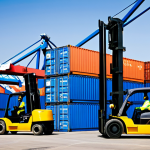Have you ever been on a conference call where cultural nuances and ambiguous phrasing turned a straightforward negotiation into a bewildering maze? In the high-stakes arena of international trade, crystal-clear communication isn’t just a courtesy; it’s the bedrock of successful deals and lasting partnerships.
That’s precisely why demonstrating robust proficiency in trade-specific English has become an invaluable asset, a true game-changer that transcends geographical boundaries and opens up incredible opportunities.
From my own journey navigating complex import-export agreements, I’ve seen firsthand how the ability to articulate intricate details precisely can seal a deal that otherwise might have crumbled due to simple misunderstanding.
It’s more than just language; it’s about building trust and demonstrating professional acumen on a global stage. Let’s get into the specifics. The demand for professionals who can effectively bridge linguistic and cultural gaps in global commerce has never been higher.
With supply chains constantly evolving, digital trade exploding, and geopolitical shifts redrawing economic maps, the nuances of business English become absolutely critical.
I’ve personally experienced the relief when a foreign partner instantly grasps a complex contractual clause because of well-chosen terminology, saving hours of back-and-forth.
It’s this kind of precision that differentiates merely “speaking English” from “mastering trade English.” In an era where AI translation tools are rapidly advancing, you might wonder if human linguistic expertise still holds its weight.
But what AI often misses are the subtle implications, the cultural sensitivities, and the art of negotiation – skills that are inherently human and paramount in high-value international interactions.
The future of trade communication isn’t just about what’s said, but how it’s understood, and that requires a human touch. The ability to articulate complex financial terms or explain shipping logistics to a diverse, global audience isn’t just a skill; it’s a superpower in today’s interconnected world.
It allows you to confidently lead discussions, resolve disputes efficiently, and truly project authority and trustworthiness. This deep understanding of trade English also equips you to identify potential pitfalls hidden in contractual language or to effectively navigate the ever-changing landscape of international regulations.
It’s about being proactive, not reactive, in a world that demands agility.
Navigating the Labyrinth of International Trade Agreements

There’s a particular kind of anxiety that settles in when you’re reviewing a critical international contract, knowing that a single misplaced comma or an ambiguous phrase could cost your company millions.
I’ve been there, poring over pages late into the night, realizing that the standard legal English I knew from domestic dealings simply wasn’t cutting it.
It’s not just about understanding the words; it’s about grasping the precise, often nuanced, legal and commercial implications within a global context.
This mastery of trade-specific English goes beyond simple translation; it’s about anticipating potential misinterpretations, identifying loopholes, and ensuring that every party involved has an identical understanding of their obligations and rights.
Think about the intricacies of Incoterms, for instance, or the subtle differences in indemnification clauses across jurisdictions. I remember one negotiation where a partner from Southeast Asia initially misinterpreted a ‘best efforts’ clause as a definitive guarantee, leading to a significant standstill.
It took precise, patient, and culturally sensitive linguistic mediation to clarify the legal intent without causing offense, ultimately salvaging a vital deal.
This deep dive into contractual language is where professional proficiency truly shines, safeguarding your interests and fostering long-term, reliable partnerships.
1. Decoding Legal Jargon and Clause Interpretation
When you’re dealing with international contracts, it’s a whole different ballgame compared to your local agreements. The legal jargon isn’t just complex; it’s laden with cultural and legal precedents that can differ wildly from one country to the next.
I once worked on a deal where the term “force majeure” had to be meticulously defined for a client in a region prone to specific natural disasters, ensuring that the contractual understanding perfectly aligned with their local legal framework and historical challenges.
This wasn’t a simple dictionary lookup; it required understanding the common law versus civil law interpretations, and how specific jurisdictions handle unforeseen circumstances.
My experience has taught me that simply knowing what a word means isn’t enough; you need to understand its *implication* within the unique legal tapestry of the countries involved.
For example, the term “reasonable endeavors” might mean something quite different in a common law country like the UK versus a civil law country in continental Europe, where the concept might be less flexible.
This critical understanding allows you to spot potential areas of dispute before they even arise, saving an immense amount of time, money, and professional goodwill down the line.
It’s about more than just parsing sentences; it’s about foresight in contract management.
2. The Cost of Ambiguity: Real-World Consequences
The consequences of ambiguous language in trade agreements are often catastrophic, leading to protracted legal battles, financial losses, and irreparable damage to business relationships.
I vividly recall a situation where a multi-million-dollar shipment was held up in customs for weeks because the packing list description contained a broadly generic term that didn’t meet the precise import regulations of the destination country.
What seemed like a minor oversight in a non-native speaker’s English cost the company significant demurrage fees and disrupted an entire supply chain.
It was a painful lesson learned about the immense value of crystal-clear, unambiguous terminology in every single document. This isn’t theoretical; it’s the real, tangible impact of communication breakdowns.
Every clause, every definition, every term in a trade contract is a potential point of failure if not perfectly understood by all parties. This is why having someone who can not only speak the language but truly *master* its trade-specific nuances is non-negotiable.
It helps prevent those agonizing phone calls trying to untangle a mess that could have been avoided with a more precise initial agreement.
Forging Unbreakable Bonds: Cultural Nuances in Global Business
Communication is never just about the words themselves; it’s deeply interwoven with culture, context, and unspoken expectations. In my years facilitating cross-cultural trade discussions, I’ve seen firsthand how a well-intentioned phrase can be misinterpreted, or how a subtle shift in tone can completely alter the dynamics of a negotiation.
It’s not enough to be grammatically correct; you need to be culturally astute. For instance, directness, which is highly valued in some Western business cultures, can be perceived as aggressive or even rude in certain Asian or Middle Eastern contexts, where indirect communication and relationship-building are paramount.
I remember a time when a British colleague, accustomed to blunt feedback, almost derailed a sensitive discussion with a Japanese partner by being too direct about a product defect.
My role then became one of a linguistic and cultural bridge-builder, rephrasing statements to convey the same message with the necessary deference and respect, ultimately preserving the relationship.
This ability to navigate the unspoken rules of engagement, to read between the lines, and to adapt your communication style is what truly elevates a “speaker of English” to a “master of trade English.”
1. Beyond Translation: Understanding Context and Subtext
True cross-cultural communication in trade extends far beyond mere word-for-word translation. It involves understanding the underlying context, the historical baggage, and the implicit meanings that are often lost on automated translation tools or even less experienced human translators.
When I was involved in a series of export negotiations with a South American client, their consistent use of the phrase “we will consider” initially led our team to believe they were truly weighing their options.
However, after several interactions and observing their body language and other cultural cues, it became clear that “we will consider” was often a polite way of saying “no, thank you” or “we need to find a way to decline without causing offense.” Recognizing this subtle subtext allowed us to pivot our strategy, offering alternatives that better suited their unstated needs rather than pushing for a direct acceptance of the initial proposal.
This kind of insight is invaluable because it allows you to truly connect with your counterparts, understand their genuine intentions, and tailor your approach for successful outcomes.
2. Building Cross-Cultural Credibility Through Language
Your command of trade-specific English, especially when coupled with cultural sensitivity, is a powerful tool for building trust and credibility. When you can articulate complex ideas with precision and respect for cultural differences, you demonstrate not only your professional competence but also your commitment to understanding and valuing your partners.
I’ve found that being able to gracefully navigate a conversation, even when language barriers exist, makes a profound impression. It shows you’ve invested in understanding their world, which in turn fosters a deeper sense of reliability.
Consider how different cultures handle silence in negotiations, or the use of humor. A well-placed, appropriate, and culturally sensitive joke can sometimes break tension, while a poorly timed one can completely backfire.
My personal experience has repeatedly shown me that partners are more willing to share critical information, be more flexible in negotiations, and commit to long-term ventures when they feel truly understood and respected, and much of that comes down to the way you wield language.
The Art of Persuasion: Crafting Winning Trade Negotiations
Negotiation in international trade is a delicate dance, a strategic interplay of proposals, counter-proposals, and subtle concessions. And at its heart is language – the precise vehicle through which you exert influence, build rapport, and ultimately, close deals that benefit all parties.
I’ve personally experienced the thrill of guiding a complex negotiation to a successful close, knowing that every phrase, every nuanced choice of words, contributed to that outcome.
It’s about more than just stating your terms; it’s about framing them in a way that resonates with your counterpart’s interests, addresses their concerns, and subtly guides them towards your desired solution.
For example, instead of saying “You must agree to this price,” a master of trade English might say, “Given the current market dynamics and the volume you’re projecting, we believe this pricing structure offers the optimal balance of value and sustainability for both our organizations, ensuring long-term profitability.” The difference is profound – one is a demand, the other an invitation to a mutually beneficial arrangement.
1. Strategic Phrasing for Optimal Outcomes
The words you choose, and the way you string them together, can dramatically alter the trajectory of a negotiation. Strategic phrasing involves anticipating your counterpart’s potential objections and proactively addressing them, or subtly highlighting the benefits that align with their specific goals.
I recall a difficult negotiation for a major raw material contract where the supplier was hesitant about our payment terms. Instead of simply reiterating our standard terms, I rephrased our proposal, linking it directly to their stated desire for predictable cash flow and emphasizing our consistent on-time payment history with other long-term partners.
This reframing, focusing on their benefits rather than our demands, opened up a new avenue for discussion and ultimately led to an agreeable compromise.
It’s about understanding the psychology behind the words, not just their literal meaning. Knowing when to be firm, when to be flexible, and when to introduce a persuasive anecdote are all part of the linguistic toolkit that leads to optimal negotiation outcomes.
2. Handling Disputes and Discrepancies with Diplomatic Language
Disputes are an inevitable part of international trade, but how you handle them defines your professionalism and future relationships. This is where diplomatic language becomes your most potent weapon.
Instead of accusatory language like “You failed to deliver,” a skilled negotiator would use phrases like, “We’ve noticed a discrepancy between the agreed-upon delivery schedule and the actual arrival time, which has caused some unforeseen logistical challenges on our end.
Could you help us understand the circumstances better so we can work together to rectify this?” This approach de-escalates tension, invites collaboration, and focuses on problem-solving rather than blame.
I’ve personally mediated several high-stakes disputes where emotions ran high, and it was consistently the ability to use calm, clear, and non-confrontational language that steered the conversation back to a constructive path.
It’s about preserving the relationship even when addressing significant issues, ensuring that a current problem doesn’t derail future opportunities.
Streamlining Global Logistics: Precision in Supply Chain English
In the intricate dance of global supply chains, every single step, from raw material sourcing to final delivery, relies on exceptionally precise communication.
Misunderstandings in this domain aren’t just inconvenient; they can lead to massive delays, spoiled goods, and significant financial penalties. I’ve spent countless hours coordinating international shipments, and what I’ve learned is that clarity in documentation and verbal communication about logistics is paramount.
It’s about ensuring that everyone from the freight forwarder in Rotterdam to the customs agent in Los Angeles has an exact, shared understanding of what’s being shipped, where it’s going, and under what conditions.
When I personally managed a project involving perishable goods, the detailed and unambiguous description of packaging requirements, temperature controls, and customs codes in English documents made all the difference in preventing spoilage and ensuring smooth transit across multiple borders.
This level of detail, often overlooked by those without a deep grasp of trade English, is what keeps the wheels of global commerce turning smoothly.
1. From Incoterms to Delivery: Clarity in Every Step
Every stage of the supply chain journey is dotted with specific terminologies and protocols that, if misunderstood, can lead to costly errors. Take Incoterms, for instance – these globally recognized rules are vital, yet their precise implications regarding risk, cost, and responsibility transfer are often misinterpreted.
I’ve encountered situations where a client believed their supplier was responsible for insurance up to their warehouse, only to find out, due to a misinterpretation of “FOB,” that their responsibility ended much earlier.
This exactness extends to shipping instructions, hazardous material declarations, and even the simple labeling of cartons. The ability to clearly articulate these details, whether in a Bill of Lading or a direct email to a warehouse manager, minimizes delays and ensures compliance.
My own experience navigating complex multi-modal shipments has shown me that leaving even the slightest room for ambiguity can result in goods being held up indefinitely or incurring unexpected charges at port.
2. Real-time Troubleshooting and Crisis Communication
When unforeseen issues arise in the supply chain – a shipment rerouted due to a storm, a customs clearance delay, or unexpected quality control issues – the ability to communicate swiftly and precisely in trade English becomes absolutely critical.
These are high-pressure situations where every minute counts, and clear communication can save a company from immense losses. I once had to coordinate a frantic rerouting of a crucial component shipment from Asia to Europe when a critical transport hub became inaccessible due to civil unrest.
This involved real-time communication with multiple logistics partners across different time zones, ensuring everyone understood the new itinerary, documentation requirements, and contingency plans.
There was no room for error or misinterpretation. Below is a table illustrating common logistical communication areas and the impact of clear vs. ambiguous English:
| Logistical Area | Clear English Communication | Ambiguous English Communication | Potential Impact of Ambiguity |
|---|---|---|---|
| Shipping Instructions | “Shipment must be palletized, shrink-wrapped, and marked ‘Fragile – Handle with Care’ on all sides. Use HTS Code 8471.60.2000.” | “Package well and send carefully.” | Goods damaged in transit; customs delays due to incorrect classification; increased insurance claims. |
| Payment Terms (e.g., DDP) | “Supplier is responsible for all costs and risks, including customs duties and taxes, until goods are delivered to buyer’s nominated premises in NYC.” | “Supplier pays until delivery.” | Unexpected import duties charged to buyer; confusion over responsibility for local delivery fees; disputes over final cost. |
| Documentation Requirements | “Original Bill of Lading, Commercial Invoice (3 copies), Packing List, and Certificate of Origin required for customs clearance at Port of Oakland.” | “Send all necessary papers.” | Shipment held indefinitely at customs; demurrage charges accrue; missed deadlines for product launch. |
| Quality Control Reports | “Batch 3A shows 5% defect rate due to ‘incomplete coating application’ on units 101-150. Requires immediate rework.” | “Some items in recent batch are bad.” | Supplier cannot identify specific problem; entire batch rejected; production line halted; long-term trust eroded. |
This level of detailed, precise communication, often happening under immense pressure, is where mastery of trade English truly differentiates professionals.
Empowering Your Global Presence: Digital Trade Communication
In today’s interconnected world, global trade largely happens across digital platforms, whether through e-commerce marketplaces, video conferencing, or instant messaging apps.
This digital shift doesn’t diminish the need for excellent trade English; in fact, it amplifies it. The immediacy of digital communication means that misinterpretations can escalate faster, and the absence of non-verbal cues places an even greater premium on crystal-clear written expression.
I’ve personally seen a promising online negotiation stall because of a series of emails filled with jargon and colloquialisms that didn’t translate well, leaving the international client utterly bewildered.
Conversely, I’ve also witnessed how concise, professional, and culturally sensitive emails can instantly establish credibility and build trust even across thousands of miles.
Mastering trade English in a digital environment means being adept at conveying complex ideas succinctly, understanding the nuances of professional online etiquette, and projecting confidence and authority through your written words.
1. Mastering Online Platforms for Seamless Transactions
From Alibaba and Amazon Global Selling to specialized B2B trade portals, digital platforms are the new frontier of international commerce. Each platform often has its own set of communication expectations, from product listings and inquiries to dispute resolution messages.
Crafting compelling, compliant, and clear product descriptions in trade English is paramount. It’s not just about showcasing features; it’s about adhering to regulatory language, intellectual property disclaimers, and warranty information that resonate with diverse international buyers.
I’ve helped numerous small businesses refine their online presence, ensuring their descriptions avoided colloquialisms and accurately conveyed product specifications using universally understood trade terminology.
The goal is to minimize customer service inquiries stemming from ambiguity and to maximize conversion rates by building immediate trust through professional language.
This attention to detail on digital channels ensures a smooth customer journey and fosters a global reputation for reliability.
2. The Power of Professional Correspondence and Virtual Meetings
Even with advanced video conferencing, a significant portion of digital trade communication still happens via email, chat, and other written forms. Your ability to draft a professional email that is both concise and comprehensive can make or break a deal.
I’ve coached executives on how to structure emails to international partners, emphasizing clarity, politeness, and the strategic placement of key information.
For example, instead of a long, rambling email, starting with a clear objective and using bullet points for complex details ensures that busy global executives grasp the core message instantly.
Virtual meetings, while offering some visual cues, still demand heightened linguistic precision. Technical glitches or time zone differences can truncate conversations, making every word count.
I’ve found that preparing a concise agenda with clear action items, and following up with an equally clear summary email in impeccable trade English, is crucial for maintaining momentum and accountability in remote global collaborations.
Protecting Your Interests: Regulatory Compliance and Risk Mitigation
The landscape of international trade is constantly shifting, with new regulations, tariffs, and sanctions emerging regularly. Staying compliant and mitigating risks hinges on your ability to accurately interpret and communicate these complex legal and policy frameworks.
This isn’t just about avoiding penalties; it’s about proactively safeguarding your business’s future. I’ve personally helped companies navigate thorny situations involving sudden changes in import duties or export controls, where a precise understanding of the new English-language directives, and the ability to articulate our compliance strategies to authorities, made all the difference.
It’s an area where “close enough” is never good enough; the exact wording of a regulation can determine whether your product crosses a border smoothly or gets seized.
This keen attention to the nuances of regulatory English is a vital asset for any professional involved in global commerce.
1. Interpreting Shifting Trade Laws and Sanctions
Global trade laws, tariffs, and economic sanctions are incredibly dynamic, and their implementation is often communicated through dense, technical English documents.
The challenge isn’t just to read them, but to accurately interpret their specific impact on your operations. For instance, understanding the precise definitions of “dual-use goods” or “restricted parties” under export control regulations is critical.
I recall working with a tech company that nearly shipped a seemingly innocuous component to a sanctioned country, not realizing the item fell under a very specific, narrowly defined export restriction.
Only through a meticulous review of the English-language regulatory updates and a clear interpretation of their legal definitions were we able to identify the risk and prevent a major compliance violation that could have resulted in severe penalties and reputational damage.
This constant vigilance and deep linguistic understanding are absolutely indispensable for maintaining legal compliance in a volatile global economy.
2. Proactive Communication for Minimizing Legal Exposure
Beyond mere interpretation, your ability to communicate your compliance efforts and proactively address potential issues in clear, authoritative trade English is crucial for minimizing legal exposure.
This could involve drafting detailed internal policies, responding to inquiries from customs officials, or collaborating with legal counsel on international contracts.
When a client faced an unexpected audit regarding their sourcing practices, my team’s ability to present comprehensive documentation, articulate our due diligence process, and clearly explain our adherence to international labor standards, all in precise English, was key to a swift and favorable resolution.
It’s about being transparent, detailed, and professional in all your communications, leaving no room for misinterpretation that could lead to legal challenges.
This proactive approach, underpinned by strong linguistic capabilities, is your best defense against the complexities and risks inherent in global trade.
Future-Proofing Your Career: The Enduring Value of Human Expertise
In an era where artificial intelligence and machine translation are advancing rapidly, it’s natural to wonder about the future of human linguistic expertise in trade.
However, from my perspective, the value of a human with a deep mastery of trade English is not diminishing; it’s becoming even *more* critical. While AI can translate words, it struggles profoundly with understanding the full spectrum of human emotion, cultural context, subtle negotiation tactics, and the inherent trust-building that underpins complex international deals.
I’ve used AI translation tools myself for quick checks, but I would never rely on them for high-stakes contract review or delicate diplomatic discussions.
The nuances, the ability to read body language in a video call, to adapt your tone spontaneously, or to insert a culturally appropriate anecdote – these are uniquely human skills that define success in global trade.
AI can be a tool, but it is not, and likely will not be, a replacement for the discerning human mind.
1. AI’s Role vs. Human Intuition in Complex Trade Scenarios
AI tools are fantastic for handling large volumes of data, for basic translations, and for identifying patterns. They can speed up information retrieval and even draft preliminary documents.
But when it comes to the messy, unpredictable world of human interaction in trade, AI hits a wall. Consider a scenario where a long-standing partner unexpectedly proposes a drastic change to an existing agreement.
An AI might translate their words perfectly, but it won’t pick up on the underlying anxiety in their voice, the slight hesitation, or the unspoken cultural pressure they might be under.
A human expert, drawing on years of experience and intuition, can sense these unstated elements and adjust their response accordingly, perhaps by offering a sympathetic ear first, then exploring flexible solutions that address the partner’s underlying distress, not just their stated demand.
My own career has been built on these very human insights – the ability to navigate ambiguity, to build rapport through shared understanding, and to resolve conflicts with empathy, skills AI simply cannot replicate in high-value, relationship-driven commerce.
2. Continuous Learning: Staying Ahead in a Dynamic Global Market
The world of international trade is constantly evolving, with new markets emerging, regulations changing, and digital tools transforming how business is done.
To remain an indispensable asset, continuous learning in trade English isn’t just an option; it’s a necessity. This means staying updated not only on new trade terminologies and legal frameworks but also on emerging cultural trends that impact communication.
I regularly attend webinars on new trade agreements, read international business journals, and even engage in online forums to understand how different regions are adapting their business practices and communication styles.
This commitment to ongoing education ensures that my expertise remains sharp and relevant, allowing me to anticipate challenges and adapt my communication strategies effectively.
It’s about recognizing that language is a living, breathing entity that evolves with global commerce, and staying abreast of those changes is key to future-proofing your career in this exciting field.
Concluding Thoughts
As the global marketplace continues its relentless evolution, the nuanced mastery of trade English isn’t just an advantage; it’s a fundamental pillar for success. I’ve seen firsthand how this precise linguistic skill empowers individuals and companies to navigate complex international waters, build enduring relationships, and ultimately, seize unparalleled opportunities. It imbues you with the confidence to lead negotiations, the clarity to prevent costly errors, and the diplomatic finesse to resolve disputes, ensuring your global ambitions are not just dreams, but tangible realities. Investing in this expertise is truly future-proofing your career in an increasingly interconnected world.
Useful Information
1. Immerse Yourself in Trade-Specific Literature: Go beyond general English news. Dive into publications like *The Wall Street Journal*, *Financial Times*, or industry-specific journals focusing on international trade, shipping, or global economics. Pay close attention to the vocabulary and phrasing used in articles about trade agreements, tariffs, and supply chain issues.
2. Seek Specialized Courses and Certifications: Look for advanced business English courses that focus on legal, contractual, or international trade English. Many universities and private institutions offer programs or certifications specifically designed for professionals dealing with cross-border commerce.
3. Engage with International Professionals: Actively participate in global trade forums, webinars, or networking events. These platforms provide invaluable opportunities to practice your trade English in real-time discussions, understand diverse accents, and grasp cultural communication styles from professionals across the globe.
4. Analyze Real-World Trade Documents: Get your hands on actual Incoterms rules, Bills of Lading, international sales contracts, or customs declarations. Methodically break down the language, identifying precise terminology, clause structures, and potential areas for ambiguity. This practical application solidifies theoretical knowledge.
5. Practice Role-Playing Negotiation Scenarios: Find a study partner or join a group to simulate international business negotiations. This hands-on practice helps you develop strategic phrasing, diplomatic language for handling disputes, and the ability to articulate complex proposals under pressure, honing your persuasive communication skills.
Key Takeaways
Mastery of trade English is indispensable for success in global commerce. It underpins effective contract interpretation, mitigates the risks of ambiguity, and fosters strong cross-cultural business relationships. Furthermore, precise communication in digital trade and logistics is critical for operational efficiency, while a deep understanding of regulatory English ensures compliance and minimizes legal exposure. Ultimately, human expertise in these nuanced linguistic and cultural aspects remains invaluable, surpassing AI capabilities in complex, relationship-driven international scenarios, necessitating continuous learning to stay ahead in a dynamic global market.
Frequently Asked Questions (FAQ) 📖
Q: Given how critical this proficiency in trade English sounds, what are the most effective practical steps someone can take to truly master it, beyond just basic language learning?
A: From my own experience, it’s about diving headfirst into practical application, not just theory. You need to immerse yourself. I found that actually participating in mock negotiations, even if they were just with colleagues, was incredibly valuable.
It forces you to think on your feet and use the specific jargon – terms like “FOB,” “CIF,” or “Letter of Credit” – in a dynamic context. Beyond that, deep-diving into specific industry documents, like actual Bills of Lading or Incoterms manuals, and truly understanding their nuances saved my skin more times than I can count.
It’s not about memorizing definitions; it’s about grasping the implications of each word. And honestly, seeking out opportunities to present or explain complex trade concepts to non-experts forces you to simplify and clarify your thoughts, which ironically deepens your own understanding.
It’s a painful but necessary growth spurt.
Q: With
A: I translation tools like Google Translate and DeepL becoming so sophisticated, why is investing in human mastery of trade English still so crucial, rather than just relying on technology?
A2: That’s a question I hear a lot, and it’s a fair one. Look, AI is fantastic for quick translations of straightforward text, but it absolutely falls flat when it comes to the true human elements of international trade.
I remember a negotiation where an AI-translated phrase completely missed the subtle cultural deference a Japanese partner was conveying, almost leading to a misinterpretation of their flexibility.
AI can’t read body language, pick up on vocal inflections, or understand the unspoken power dynamics in a room. It certainly can’t build rapport or trust over a shared laugh about a logistical snafu.
When you’re talking about high-value contracts or sensitive dispute resolution, you need human intuition, empathy, and the ability to strategically choose words that not only convey information but also influence, persuade, and connect.
AI transmits data; humans build relationships. And in trade, relationships are everything.
Q: Beyond just helping close individual deals, how does this deep understanding of trade English genuinely translate into significant long-term career advancement and broader opportunities?
A: Oh, it’s a total game-changer for your career trajectory, trust me. When you genuinely master trade English, you stop being just a translator of words and become a translator of intent and opportunity.
I’ve seen colleagues stuck in junior roles because they couldn’t articulate their ideas effectively to global stakeholders, while others rocketed up. For me, it opened doors to leading cross-border projects, because I wasn’t just competent; I was confident.
You become the go-to person for complex, high-stakes international discussions – the one who can untangle a messy contract or calmly de-escalate a heated argument between partners from different continents.
This visibility and demonstrated capability naturally lead to more responsibility, higher-profile assignments, and ultimately, leadership roles. It means you’re not just participating in global trade; you’re actively shaping it, and that’s a superpower in today’s interconnected world.
📚 References
Wikipedia Encyclopedia
구글 검색 결과
구글 검색 결과
구글 검색 결과
구글 검색 결과
구글 검색 결과






